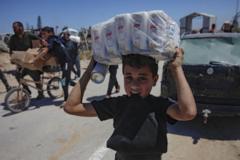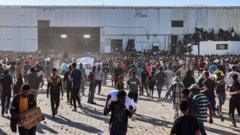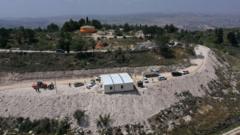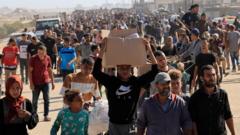The United Nations has condemned Israel's new aid program launched in southern Gaza amidst panicked scenes. Thousands of Palestinians rushed a food distribution site, leading to Israeli forces firing warning shots.
U.N. Critiques New Israeli Aid Operation Amid Gaza Chaos

U.N. Critiques New Israeli Aid Operation Amid Gaza Chaos
A recent Israeli-backed aid initiative in Gaza has drawn severe criticism following a chaotic distribution event.
The Israeli initiative, aimed at circumventing Hamas and the United Nations, has faced backlash both regionally and globally, with accusations of exacerbating the humanitarian crisis.
On May 28, 2025, United Nations officials expressed grave concern over the chaotic launch of the Gaza Humanitarian Foundation's new aid operation, which was marred by panic as hundreds of Palestinians tried to access limited food supplies. Following the distribution event in Rafah, where Israeli soldiers reportedly fired warning shots to control the crowd, the U.N. characterized the initiative as dangerously insufficient.
Israeli leaders argue that this operation is a critical strategy to diminish Hamas's influence over aid distribution in Gaza. However, the U.N. and several humanitarian organizations have dismissed the initiative as politically driven and inadequate in addressing the needs of the affected Gazan population. Major Western allies of Israel have also expressed dissatisfaction, emphasizing that humanitarian efforts must remain apolitical.
This initiative comes after a two-month blockade on humanitarian aid was recently lifted. With growing concerns regarding Israel's intentions to escalate military operations against Hamas, Prime Minister Benjamin Netanyahu has vowed that the military offensive is necessary for undermining the group.
As the Gaza Humanitarian Foundation attempts to establish four aid distribution centers, overseen by Israeli military personnel and private American contractors, European diplomats have voiced their disappointment. Kaja Kallas, the E.U.'s chief diplomat, stated that the use of overwhelming force and civilian casualties is unacceptable. She stressed that aid distribution should remain humanitarian and free from military influence.
The U.N.'s criticisms, alongside widespread allegations of human rights abuses, suggest that Israel's new strategy may be widening the rift between the Israeli government and international humanitarian organizations. As the situation evolves, the effects of these policy shifts on the ground in Gaza remain to be seen.
On May 28, 2025, United Nations officials expressed grave concern over the chaotic launch of the Gaza Humanitarian Foundation's new aid operation, which was marred by panic as hundreds of Palestinians tried to access limited food supplies. Following the distribution event in Rafah, where Israeli soldiers reportedly fired warning shots to control the crowd, the U.N. characterized the initiative as dangerously insufficient.
Israeli leaders argue that this operation is a critical strategy to diminish Hamas's influence over aid distribution in Gaza. However, the U.N. and several humanitarian organizations have dismissed the initiative as politically driven and inadequate in addressing the needs of the affected Gazan population. Major Western allies of Israel have also expressed dissatisfaction, emphasizing that humanitarian efforts must remain apolitical.
This initiative comes after a two-month blockade on humanitarian aid was recently lifted. With growing concerns regarding Israel's intentions to escalate military operations against Hamas, Prime Minister Benjamin Netanyahu has vowed that the military offensive is necessary for undermining the group.
As the Gaza Humanitarian Foundation attempts to establish four aid distribution centers, overseen by Israeli military personnel and private American contractors, European diplomats have voiced their disappointment. Kaja Kallas, the E.U.'s chief diplomat, stated that the use of overwhelming force and civilian casualties is unacceptable. She stressed that aid distribution should remain humanitarian and free from military influence.
The U.N.'s criticisms, alongside widespread allegations of human rights abuses, suggest that Israel's new strategy may be widening the rift between the Israeli government and international humanitarian organizations. As the situation evolves, the effects of these policy shifts on the ground in Gaza remain to be seen.





















